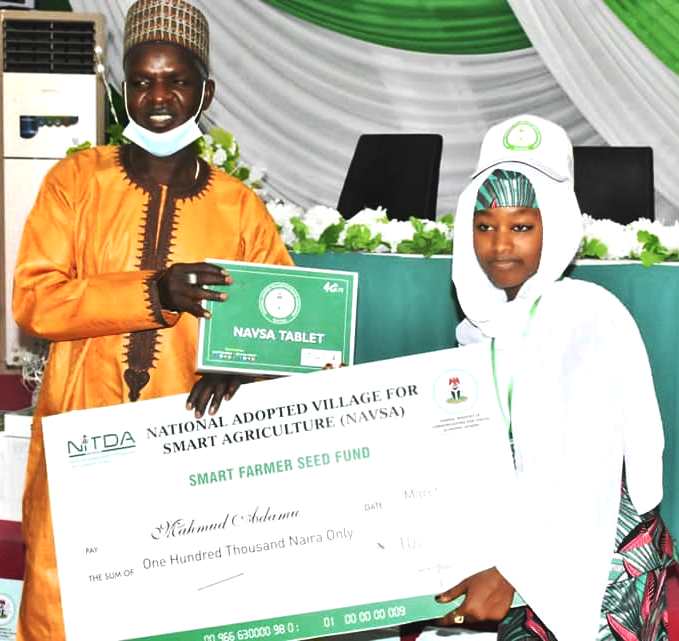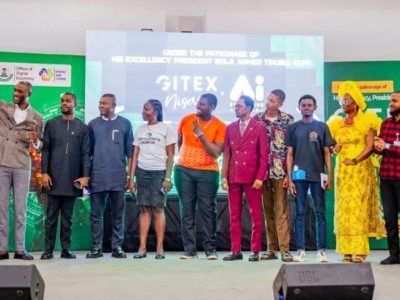
The National Information Technology Development Agency (NITDA) is targeting to engage 5,000 students of Federal University Dutse (FUD) to become smart farmers in the next 10 years.
Director General, NITDA, Kashifu Inuwa Abdullahi, revealed this over the weekend at the closing ceremony of the AgTechpreneurship Training and Empowerment of the National Adopted Village for Smart Agriculture (NAVSA) inside the Federal University Dutse (FUD) in Dutse. Jigawa state.
RELATED NAVSA: Creating A Viable Smart Agriculture For Nigerian Farmers
Abdullahi said NAVSA, an initiative of NITDA under the supervision of Ministry of Communications and Digital Economy, was designed to drive policies on diversification by President Muhammadu Buhari notably as it concerns the National Digital Economic Policy and Strategy (NDEPS).
“One of the critical sectors of the economy in Nigeria with a high potential for economic diversification is agriculture. The sector was reported to have contributed 26.84 per cent to overall GDP in real terms in Q4 2021,” said Abdullahi.
He added: “The sector grew by 3.58 per cent (year-on-year) in the same quarter,” even as he noted that an average Nigerian farmer still makes use of primitive farm tools like hoes, and cutlass among others – all of which constitute setbacks to productivity, food security, and contribution of agriculture to the country’ GDP.
“Also, access to markets is one of the biggest challenges faced by smallholder farmers which directly affects their income and living standards.
“Lack of access to the market poses serious threats to farmers especially their inability to sell off their produce at good prices. Hence, this leads to massive post-harvest losses and food wastage,” the NITDA boss said.
NAVSA is helping to remodel the sector by fostering smart thinking and digital technology to transform the agricultural sector in addition to attracting youngsters into farming business.
His words: “We hope to produce the next generation of agric enterprise millionaires. Second, this model supports continuous adoption of the next batch and generation of FPY students.
“The continuous adoption and sustainability of the model are premised on the design of the system that ensures continuous reinvestment of the current capital and 25 per cent profit at the end of each season by each adopted farmers or students.”
According to Abdullahi, the agency is targeting to have thousands of youngsters leveraging emerging technologies to improve farm yields and their engagement of the agricultural sector. He was represented at the event by NITDA’s Acting Director, Digital Economy Development Department, Salisu Kaka
His words: “In the next ten years in FUD, more than 5,000 students would have benefited with possibilities of an additional 500, 000 direct and indirect jobs.
“This is only in FUD. NAVSA will create win-win business models for ecosystem players with far-reaching network effects to create values that never existed before across the agriculture value chain.
“In the coming years, we would start integrating emerging technologies such as remote sensing, geospatial analysis, Artificial Intelligence, Big data analytics, blockchain among others to develop smart agriculture solutions that create new business models and opportunities across the agric value chain for the ecosystem players. This will, in no small measure, boost the economic diversification, growth, and prosperity of the country.
“NAVSA will make it possible to precisely capture data from individual farms and fields, combine it in macro-level data sets, and utilize those sets in increasingly cost-effective ways.
“Digital data in agriculture is potentially so transformative. It offers farmers access to tailored information and insights that allow individuals to optimise their production, gain access to appropriate products and services, and explore new linkages with markets.”
Highlight of the five day event was the inspection of Smart Irrigation and Smart Brooding System donated by NITDA; presentation of NAVSA digital devices and N100, 000 (Smart Farmers Seed Fund) to each of the 100 beneficiaries of the AgTechpreneurship Training and Empowerment initiative. The ceremony had the Deputy Vice-Chancellor Academics, Professor Abdulsalam Balarabe, in attendance.





























